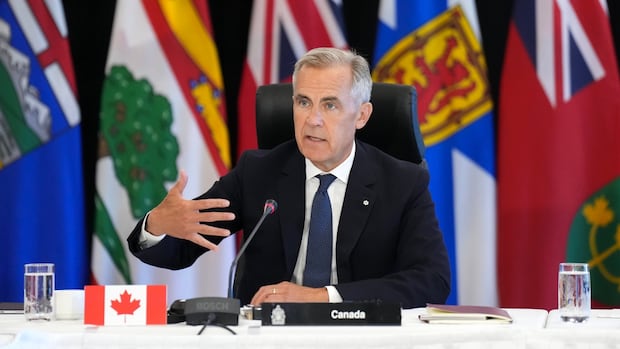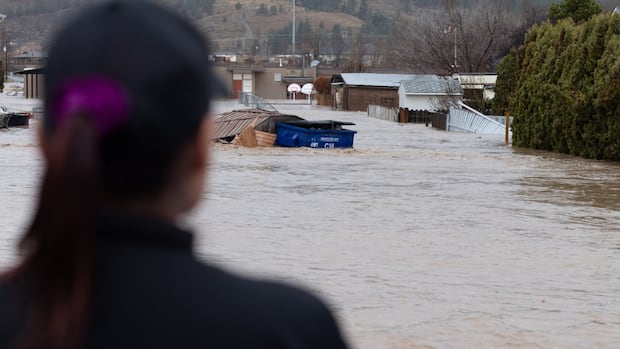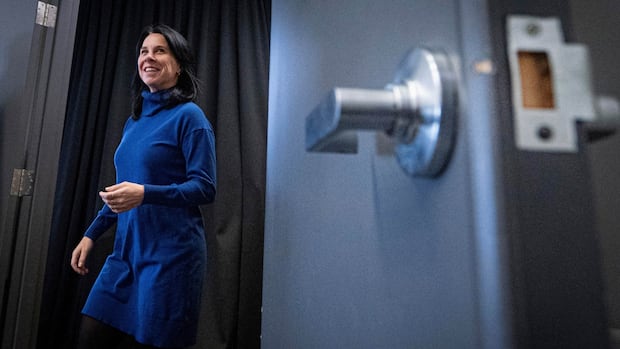Prime Minister Mark Carney kicked off his meeting with Canada’s premiers in Huntsville, Ont., promising to battle the Trump administration at the negotiating table to ensure the country gets a good trade deal, while also doing everything he can to strengthen the Canadian economy.
“We are looking for the best deal for Canada; we are only going to accept the best deal for Canada,” Carney said Tuesday.
Carney is delivering a detailed briefing about his government’s ongoing trade negotiations with the Trump administration as the two countries work toward reaching an agreement by Aug. 1.
The prime minister’s visit lands in the middle of the three-day first ministers’ meeting in the Muskoka region, where the premiers are discussing their own response to the trade war.
“The central issues to be addressed at this meeting are trade relations and our current trading relationship with the United States, and any steps we can take to build a strong Canadian economy,” Carney said.
Carney arrived on Monday evening to have dinner with the premiers at Ford’s cottage, after spending the day hosting a bipartisan delegation of U.S. senators in Ottawa to discuss trade.
The prime minister said Canada’s economic response to U.S. President Donald Trump’s tariffs is built on two tracks: supporting affected industries, such as lumber, steel, auto manufacturing and aluminum production; and ensuring Canada’s economy grows by breaking down internal trade barriers and quickly approving major projects.
Approving major infrastructure projects like ports, pipelines and mines will be easier now that Bill C-5, or the One Canadian Economy Act, has become law, allowing approvals for projects of national importance to be fast-tracked.
With that, Carney said, comes “a shift in attitude” from the federal government around major new projects, moving from “why build, to how to build — and how to work together in order to build.”
Carney said his new federal projects office will be open by Labour Day, which he said will provide a single point of contact for provinces, companies and communities looking to get major nation-building projects approved.
Before going into a closed-door meeting with the premiers, Carney thanked them for their work in signing agreements to take down interprovincial trade barriers “so Canadians can work where they want and buy what they want.”
Ensuring energy security
Before the discussions kicked off Tuesday, Ford, Saskatchewan Premier Scott Moe and Alberta Premier Danielle Smith signed a memorandum of understanding to build new energy and trade infrastructure.
CBC News asked the premiers if Canada needs to replace Line 5 — the more than 1,000-kilometre-long pipeline carrying 540,000 barrels of oil and natural gas liquids daily across Wisconsin and Michigan to refineries in Sarnia, Ont. — regardless of whether there is a private-sector proponent behind such a plan.
“I believe so,” Ford said. “The governor of Michigan … constantly threatens to cut off Line 5. That would basically shut down our airports, shut down a big part of Ontario. We can’t chance it any longer. We need to be independent, we need a pipeline going to southwestern Ontario to one of the refineries, and be self-reliant.
“We can’t rely on the Americans anymore. Simple as that.”
In 2023, a U.S. court ruled in favour of the Bad River Band of the Lake Superior Chippewa, ordering Enbridge to shut down parts of the pipeline within three years and pay the band $5.2 million US for trespassing on its land after easement rights expired.
The Canadian government argued that a shutdown of the line — in operation since 1953 — would violate a 1977 Canada-U.S. pipeline agreement in which the countries agreed not to block the flow of each other’s hydrocarbons.
Enbridge wants to build a protective tunnel around a 5.8-kilometre section of the pipeline that runs along the bottom of the Straits of Mackinac, which link Lake Michigan and Lake Huron. Permits in the U.S. are being fast-tracked to see that work done, but opposition to the move remains.
Moe said Canada does not want to find itself in the same position as Europe, which recently found out what it means to be heavily reliant on oil and gas from Russia.
“We shouldn’t allow that to happen to us, as Canadians, to be reliant on another country,” Moe said. “So yes, I think as Canadians, we certainly need to have a very mature discussion about how we can provide Western Canadian oil and gas to Canadians that live in Central and Eastern Canada for our own good … not only our economic security but our energy security.”
Smith said building a pipeline entirely within Canada is “probably something that is long overdue; we probably should have done it decades ago.”






